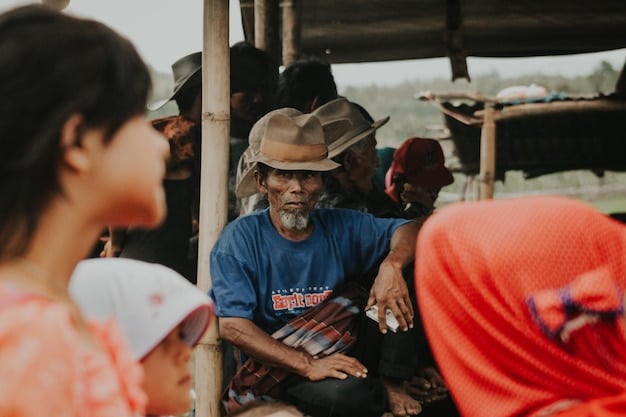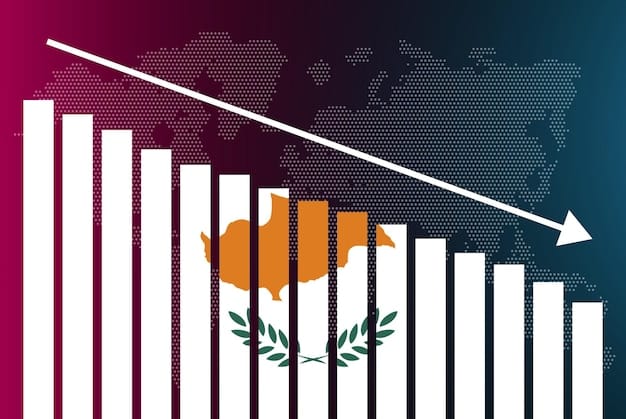NGOs in US Foreign Policy: A Critical Look at the Role in 2025

In 2025, NGOs will continue to play a significant, albeit complex, role in shaping US foreign policy through advocacy, program implementation, and monitoring, facing challenges related to funding, politicization, and effectiveness.
The influence of NGOs in US Foreign Policy: A Critical Examination for 2025 is undeniable, serving as vital conduits for humanitarian aid, human rights advocacy, and development initiatives globally. However, their role isn’t without complexities, challenges, and debates about their effectiveness and alignment with US strategic interests.
Understanding the Landscape of NGOs in US Foreign Policy
Non-governmental organizations (NGOs) have become increasingly prominent actors in the realm of international relations, particularly in the context of US foreign policy. These organizations, ranging from large international bodies to small local groups, operate independently of governments and play a crucial role in addressing global challenges.
Defining NGOs and Their Diverse Roles
NGOs are typically defined as non-profit, voluntary citizens’ groups organized on a local, national, or international level. They perform a variety of service and humanitarian functions, advocate for policy changes, and monitor human rights, environmental issues, and other areas of concern.
The Historical Evolution of NGO Involvement in US Foreign Policy
The involvement of NGOs in US foreign policy has evolved significantly over time. Initially, their role was primarily focused on providing humanitarian aid and disaster relief. However, over the years, NGOs have expanded their scope to include advocacy, development, and monitoring of human rights and governance issues.

Here are some key aspects of their evolvement:
- Increased Collaboration: NGOs now collaborate more closely with government agencies, international organizations, and private sector entities to achieve shared goals.
- Advocacy and Influence: They actively engage in policy debates, lobbying efforts, and public awareness campaigns to influence US foreign policy decisions.
- Specialized Expertise: NGOs bring specialized knowledge and expertise to various areas, such as public health, education, environmental conservation, and conflict resolution.
In conclusion, the landscape of NGOs in US foreign policy is diverse and dynamic, with organizations playing a multitude of roles and engaging in a wide range of activities.
The Multifaceted Roles of NGOs in Shaping US Foreign Policy
NGOs play various roles that significantly influence U.S. foreign policy. These roles encompass humanitarian assistance, advocacy, and promotion of democratic values. NGOs act as independent entities and also collaborate with governmental and international bodies to achieve shared objectives.
Humanitarian Assistance and Disaster Relief
One of the primary roles of NGOs is providing humanitarian assistance and disaster relief to communities affected by conflicts, natural disasters, and other crises. These organizations often operate on the front lines, delivering essential services such as food, shelter, medical care, and clean water to those in need.
Advocacy and Policy Influence
NGOs also play a crucial role in advocating for policy changes and influencing decision-making processes related to US foreign policy. They conduct research, raise awareness, and lobby government officials to promote their agendas.
Key aspects include:
- Human Rights Advocacy: Many NGOs focus on promoting human rights around the world by documenting abuses, advocating for victims, and pressing governments to uphold international standards.
- Environmental Conservation: Environmental NGOs work to protect natural resources, combat climate change, and promote sustainable development practices through advocacy and conservation efforts.
- Development Promotion: NGOs are actively involved in promoting economic development, poverty reduction, and social progress in developing countries through a range of programs and initiatives.
Promoting Democracy and Good Governance
Furthermore, NGOs are also involved in promoting democracy and good governance in countries around the world. They support civil society organizations, monitor elections, and work to strengthen democratic institutions.

In summary, NGOs influence US foreign policy by addressing urgent humanitarian needs, promoting policy changes through advocacy, and strengthening democratic governance globally.
The Impact of NGOs on Key Areas of US Foreign Policy
NGOs in US Foreign Policy: A Critical Examination for 2025 reveals significant influence across various areas, impacting human rights, development, and environmental policies. Their work provides critical on-the-ground insights and helps shape the direction of US engagement worldwide.
Human Rights and Democracy Promotion
NGOs significantly contribute to human rights and democracy promotion in US foreign policy. They monitor human rights records, advocate for political prisoners, and support democratic movements globally.
International Development and Poverty Reduction
In international development, NGOs implement projects that address poverty, improve health, and promote education. Their work often complements or fills gaps in governmental aid programs.
Environmental Protection and Climate Change
Environmental NGOs advocate for policies that protect ecosystems and combat climate change. They engage in conservation efforts, promote sustainable practices, and lobby for international environmental agreements.
The impact of these actions include:
- Raising Awareness: NGOs play a crucial role in raising public awareness about critical issues, such as human rights abuses, environmental degradation, and poverty, thereby influencing public opinion and policy priorities.
- Providing Expertise: NGOs possess specialized knowledge and expertise in various fields, which can inform policy decisions and improve the effectiveness of US foreign policy initiatives.
- Monitoring and Accountability: NGOs monitor the implementation of policies and hold governments and other actors accountable for their actions, ensuring greater transparency and responsibility in international affairs.
Ultimately, NGOs play a vital role in shaping the direction and effectiveness of US foreign policy. Their involvement offers valuable insights and helps address some of the world’s most pressing problems.
Challenges and Criticisms of NGO Involvement
While NGOs play a crucial role in shaping US foreign policy, their involvement is not without challenges and criticisms. These include concerns about funding, accountability, and political agendas. It is important to acknowledge and address these issues to ensure the effectiveness and legitimacy of NGO involvement in foreign policy.
Funding and Independence
One of the main challenges facing NGOs is securing funding while maintaining their independence. Many NGOs rely on funding from governments, foundations, and private donors.
Accountability and Transparency
Critics also raise concerns about the accountability and transparency of NGOs. Some argue that NGOs lack adequate mechanisms for monitoring their activities, evaluating their impact, and ensuring accountability to the communities they serve.
Political Agendas and Bias
Another criticism of NGOs is that they may pursue political agendas or exhibit bias in their work. Some argue that NGOs may be influenced by their donors or ideological beliefs, leading them to prioritize certain issues or approaches over others. The key concerns include:
- Lack of Oversight: Due to their independent nature, NGOs often operate with limited oversight, making it challenging to ensure they adhere to ethical standards and legal requirements.
- Mission Drift: NGOs may face pressure to align their activities with the priorities of their donors, potentially leading to mission drift and a focus on donor-driven agendas rather than community needs.
- Unintended Consequences: NGO interventions can sometimes have unintended consequences, such as creating dependency, distorting local markets, or undermining local governance structures.
In conclusion, despite their significant contributions, NGOs face many challenges. Addressing these problems can make NGO activity much more effective in the future.
The Future of NGOs in US Foreign Policy: Trends and Predictions for 2025
Looking ahead to 2025, several trends and predictions can be made about the future role of NGOs in US Foreign Policy: A Critical Examination for 2025. These include the increasing importance of technology, the rise of new actors, and the need for greater collaboration. The current state of affairs suggests several key shifts.
The Increasing Importance of Technology
Technology will play an increasingly important role in the work of NGOs, enabling them to communicate more effectively, reach wider audiences, and deliver services more efficiently. NGOs will likely explore digital tools to improve their operations.
The Rise of New Actors and Partnerships
The landscape of NGOs is likely to continue to evolve, with the rise of new actors from emerging economies and the growth of partnerships between NGOs, governments, and private sector entities. These partnerships can leverage each actor’s strengths to achieve common goals.
The Need for Greater Collaboration and Coordination
Increasingly, there is a need for greater collaboration and coordination among NGOs themselves, as well as with governments and other stakeholders.
Key predictions can be made based on the current environment:
- Focus on Localization: There will be a growing emphasis on localization, with NGOs working more closely with local communities and governments to ensure that programs are culturally appropriate and sustainable.
- Data-Driven Approaches: NGOs will increasingly rely on data and evidence to inform their strategies, measure their impact, and improve the effectiveness of their interventions.
- Adaptive Programming: NGOs will need to be more adaptive and flexible in their programming, able to respond quickly to changing circumstances and adjust their strategies as needed.
In summary, NGOs will need to adapt to new circumstances in the future. This will require incorporating new technology and forming new partnerships.
Recommendations and Policy Implications for the Future
To ensure that NGOs can effectively contribute to US foreign policy in 2025 and beyond, several recommendations and policy implications should be considered. These include strengthening funding mechanisms, promoting accountability, and fostering collaboration between NGOs and government agencies.
Strengthening Funding Mechanisms
Governments, foundations, and private donors should work together to strengthen funding mechanisms for NGOs. This could involve simplifying grant application processes, increasing funding for core operations, and providing more flexible funding to allow NGOs to adapt to changing circumstances.
Promoting Accountability and Transparency
NGOs should adopt stronger accountability and transparency measures to ensure that they are using funds effectively and achieving their intended impact. This could involve implementing robust monitoring and evaluation systems, publishing annual reports, and engaging with stakeholders to solicit feedback and address concerns.
Fostering Collaboration and Coordination
Governments, NGOs, and other stakeholders should foster greater collaboration and coordination to avoid duplication of efforts, maximize impact, and promote coherence in US foreign policy. Specific areas to address are:
- Clearly Defined Roles: Clarify the roles and responsibilities of NGOs and government agencies in implementing foreign policy, ensuring that each actor can leverage their unique strengths and expertise.
- Information Sharing: Establish mechanisms for sharing information and coordinating activities among NGOs, government agencies, and international organizations, promoting a more holistic approach to foreign policy decision-making.
- Capacity Building: Invest in capacity building initiatives to strengthen the organizational capacity of NGOs, enabling them to effectively implement programs, manage resources, and engage with stakeholders.
The future impact of NGOs in US policy hinges on these changes, and improving policy to address various concerns.
| Key Point | Brief Description |
|---|---|
| 🌍 Humanitarian Assistance | Providing aid during crises and promoting development. |
| 📢 Advocacy & Policy | Influencing policy and advocating for human rights. |
| 🤝 Collaboration | Working with governments and international bodies. |
| 🌱 Environmental Impact | Promoting environmental conservation and climate action. |
Frequently Asked Questions
NGOs are non-profit, independent groups involved in international activities, focusing on humanitarian aid, development, and advocacy. Their work is crucial in supplementing governmental efforts and addressing global issues.
NGOs monitor and report on human rights abuses, advocate for policy changes, and provide support to victims. Their efforts help in raising awareness and pressing governments to adhere to international standards.
Challenges include securing consistent funding, maintaining independence from political influence, and ensuring accountability to stakeholders. Effectively managing these challenges is key to their operational success.
Improving collaboration involves clearly defining roles, sharing information, and participating in joint capacity-building initiatives. These steps can lead to more effective and aligned foreign policy outcomes.
Technology will enhance communication, expand reach, and improve service delivery. NGOs will leverage digital tools for efficient operations, better data analysis, and increased transparency in their work.
Conclusion
In conclusion, NGOs in US Foreign Policy: A Critical Examination for 2025 shows that their role is indispensable. To maximize effectiveness, it’s crucial to address challenges related to funding, accountability, and collaboration. By adapting to emerging trends and fostering strong partnerships, NGOs can continue to play a vital role in shaping a more just and sustainable world through US foreign policy.





